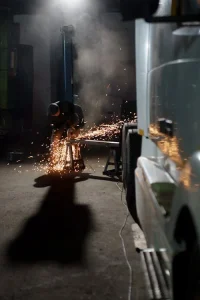A company car is a vehicle normally made available to an employee or a department for business purposes or (exceptionally) for commuting. On the other hand, a service car is a vehicle lent to an employee by the company, not only for business travel but also for personal travel.
Like a company car, a service car is also called a “company car” or “company vehicle”. A company vehicle can be a motorcycle or a car.
If the car is generally considered a company vehicle with many advantages, we will see in this article that the motorcycle is no less advantageous.
A Good Investment for the Company
A company that uses a car as a service and/or company vehicle is obliged to pay an annual tax on company vehicles (TVS) and a CO2 tax, which is not the case for another company that uses a motorcycle as a company vehicle.
A motorcycle also allows you to get through traffic. This is why it can be described as an excellent service vehicle, especially for delivery services. Furthermore, since purchasing a service and/or company motorcycle is usually based on the needs and core business of the company in question, there are a variety of models and brands available.
Opting for a company motorcycle can be a strategic choice to save money. A motorcycle is usually cheaper than a car, uses less fuel, and has fewer emissions that are harmful to the environment. It is the type of vehicle that can be easily maintained and whose accessories can be within reach of everyone.
A company that chooses a motorcycle as a service and/or company vehicle does not have to buy one; it can opt for renting or leasing.
A Good Alternative to Motivate the Staff
For a company operating in the commercial field, having a service motorcycle can optimize the performance of the staff and thus build customer loyalty. In other words, delivery services are carried out in the shortest possible time, especially since the delivery person is less tired than when delivering by bicycle.
An employee with a motorcycle as a company vehicle can also be more motivated, as he or she will no longer have to worry about being late due to a possible bus delay, crowds in the metro station during rush hour, traffic jams in big cities, etc. In addition, his private travel is considered a benefit in kind. He does not have to pay for insurance, technical inspections, or maintenance. In a technical inspection violation, the employer (the company) is responsible for paying the fines. The same applies to the maintenance costs of the service and/or company motorcycle, repairs if necessary, and fuel.
The employee who works in a remote site or a person sent on a mission in a village, a city, or a remote region will be able to get there more efficiently with a company motorcycle.
In short, the motorcycle, as a service and/or company vehicle, is advantageous for both the employer and the employee.




